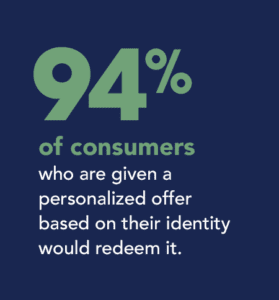SheerID CEO in MarTech Advisor: Why Telecom Brands Are Rethinking Personalization

Marketers continue to search for the best way to create a lasting connection with consumers. And identity marketing, a new form of personalized marketing, is rising to the top.
Especially now, during these uncertain times, consumers are paying close attention to how brands are engaging with them. Quality communication is far more important than quantity.
In his recent article for MarTech Advisor, “Why Telecom Brands Are Taking a New Approach to Personalized Marketing,” SheerID CEO Jake Weatherly explains why identity marketing meets this need and supports higher quality relationships between brands and consumers.
Telecom Brands Engage with Consumers in a New Way
Jake discusses how brands like Comcast and T-Mobile are using identity marketing to acquire and retain subscribers.
It’s a new way to engage:
- The brand creates a personalized offer for a consumer tribe, like students, teachers, and members of the military, based on the tribe’s deep-seated attributes and values.
- The brand invites members of that consumer tribe to take part in the unique offer.
- The consumer opts in to the offer by providing relevant information to qualify.
- The brand uses a digital verification process to confirm the consumer’s eligibility to redeem the offer.

The opportunity for brands to support consumer groups with a personalized offer is more relevant now than ever. And because the offer makes consumers feel recognized and respected, they are motivated to participate.
According to a Kelton Global survey, 94% of consumers who are given a personalized offer based on their identity would redeem it.
5 Reasons to Use Identity Marketing to Personalize Offers
Brands that use identity marketing to personalize offers to consumer tribes are seeing results on the order of 3x increased conversions and return on ad spend as high as 25:1.
Jake offers five reasons why this approach is working.
01 You Break through the Noise by Connecting with Someone’s Identity
When you market to consumers based on their sense of belonging to a tribe—part of their identity—you communicate “I recognize who you are and I want to reward that.” And since they declare their eligibility for the offer, they provide a strong signal of intent.
02 You Demonstrate Shared Values
A recent survey conducted by SheerID and The Military Times found that 8 out of 10 members of the military say being a part of the military is more important to their identity than their religion or where they’re from.
T-Mobile’s personalized offer to the military acknowledges this sense of identity and demonstrates shared values with the consumer tribe. The brand continues their long-standing commitment to honor and reward the military while also creating an emotional connection with consumers.
03 You Initiate a Relationship Built on Trust
Identity marketing allows the consumer to opt in to a relationship with the brand by providing minimal personal data to confirm eligibility. For consumers increasingly interested in protecting their data, this privacy-friendly approach kicks off a relationship built on mutual terms, reciprocity, and trust.
04 You Encourage Word-of-Mouth Sharing
Compared to buyer segments united by a common purchase or behavior, such as visiting a website, consumer tribes have strong networks. And that drives word of mouth.
In a recent survey of 500 members of the military, 76% say they learn about discounts from word of mouth, and 83% of students would share a gated offer with friends and family.

05 You Can Go All-In with a Consumer Tribe
Once you initiate a relationship with members of a consumer tribe, you can extend your program beyond a single, online offer and engender long-term loyalty among subscribers.
T-Mobile created an extensive, multi-faceted program that reflects their commitment to the military. The strategy has paid off, and the company attributed meaningful growth to the fact that they started offering segment specific offers like the one to the military.
Read the Full Article: Why Telecom Brands Are Taking a New Approach to Personalized Marketing